Is Loki the Wolverine of the MCU?
A New Variant Enters the Sacred Timeline: Cash Cow Loki
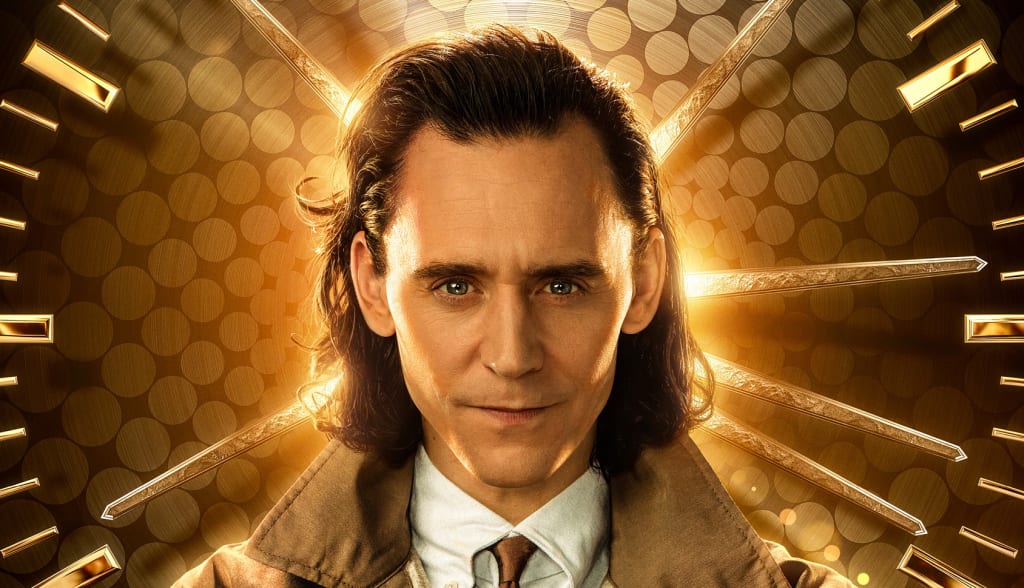
Though superhero films have been around since the birth of superhero comic books, the Marvel Cinematic Universe has redefined how the world looks at stories, media franchises and popular culture. I’m pretty sure that there isn’t a person alive (even my mum) who wouldn’t be able to recognize a picture of Robert Downey Junior as Iron Man – or, more pertinently; Tom Hiddleston as the Loki, the God of Mischief.
First introduced in Marvel Studio’s Thor in 2011 as the bastard prince of Asgard and the primary antagonist – a mantle he continued to wear all the way through until Marvel Studios The Avengers (2012). Impressive, really, given that he “died” several times throughout his tenure in the MCU. If falling off of the Bifrost won’t do it, I guess only Thanos can. And he did – the last time we saw Loki, as we had known him for 10 years – was in Marvel Studio’s Avengers: Infinity War. He died, for real this time, after fighting with Thor, the Hulk and Valkyrie against Thanos to prevent him from getting one of the infinity stones.
That’s where things begin to get confusing. After that, we saw Loki again in Marvel Studios Avengers: Endgame, but this time he had been taken back to where it all began in 2012. During the “Time Heist” plan, the Avengers head back to the invasion of New York to steal the Tesseract – aka the Space Stone – from themselves. Shenanigans ensue, and the Future-Avengers fail to grab the Tesseract from themselves as, in the midst of the shenanigans, Loki steal the stone and uses it to teleport the Hel out of dodge. When he reappears in the midst of the Gobi Desert, this is where the Loki television show picks us up again.
The TV show established off of a few key concepts: firstly, that there is one specific order of events that is foretold and cannot be deviated upon unless you want the universe – no, the multiverse – to implode, and it is called “The Sacred Timeline.” Secondly, that deviations from this Sacred Timeline are controlled and destroyed by an independent organization called the Time Variance Authority (the TVA). Who are they independent from? Well, everything – including time. Another key concept is that Loki, as we now know him, is not only a “Variant” (aka, a version of himself other than the “correct” and dead Loki), but that there have been hundreds – if not thousands of Loki Variants, and one in particular (Sylvie) is causing… Mischief.
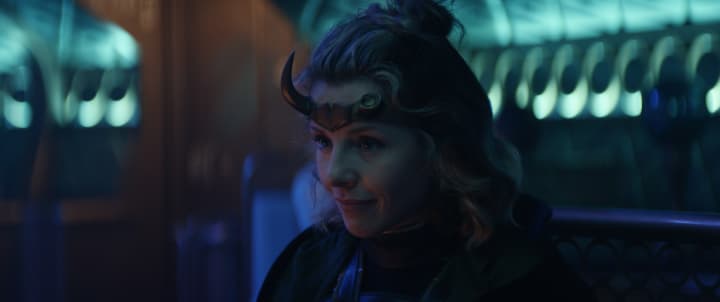
And by mischief, of course, she is planning to destroy the TVA.
I don’t know about you, but I’ve been kind of disappointed with Loki. The premise is great, and I was so excited to explore a new part of the MCU (move over Space Operas and Action-Thrillers, Weird Magic Stuff [TM] is happening) – but, following on the heels of Wandavision… Especially following on the heels of Wandavision, Loki just doesn’t take its weirdness far enough for me. Which is strange – Loki was always planned to be the third release of the MCU’s TV lineup (unlike Wandavision and The Falcon and the Winter Soldier, which swapped places due to pandemic-related production delays). The producers knew what they were following and yet… Loki isn’t a misfire, per se. But definitely a delayed and diminutive reaction.
Let’s start with production and just general visual effects. It’s weird that – for an agency that has existed since the dawn of everything and has access to all of time – that they only use dialogue, slang, costumes and references from the last 30-60 years. Weirder still how the TVA only seem to be travelling deep into the past or future, it seems that even on alien planets doomed to die, 2020 was a year that no one wanted to visit. But beyond the plot, we’ll get back to it later, Loki’s fight scenes and choreography are strangely lacking. Never before in an MCU production have I felt like I’m witnessing the actors pulling punches, or that I’m seeing them actively think about the next step in their fight routine. I imagine it’s at least slightly purposeful – to have Loki and Sylvie fight as though they are dancing rather than brawling, as a way to emphasise their preference for subterfuge and magic. But it doesn’t line up with what we’ve seen from Loki before – especially not in later films.
Which, given the now-fractured and disjointed nature of Loki’s personal history, could almost explain away the issues of pacing that the show suffers from.
Really, all of the MCU shows so far have had problems with pacing. Wandavision alienated a lot of viewers by being absolute bonkers for the first 3 (of 8) episodes, The Falcon and the Winter Soldier seemed to sag in the middle, but Loki seemed to not truly begin until episode 4 – of 6. Episode 3, “Lamentis” was a complete write-off, giving the audience nothing but fleeting fan service and barely managing to move along the plot as one would expect and need from a limited series.
But, that’s the point. When you’ve got a name like Loki front and centre, and after 10 years of treating him as a secondary character, of course, Marvel is going to give the fangirls everything they want.
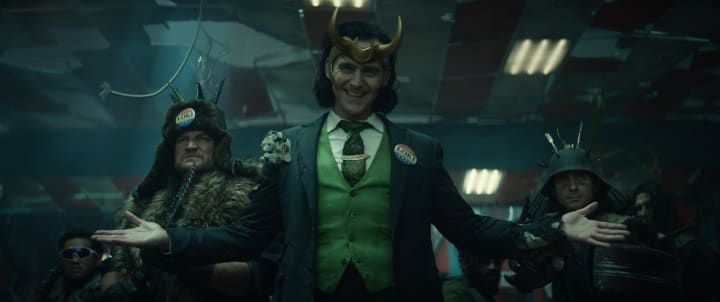
It’s just a shame that it doesn’t make for good television. Fangirls and their meta-ramblings are an intrinsic and integral part of fandom – Lord knows I love scrolling through Tumblr, emotionally feeding from their passion. But that doesn’t translate well onto the big screen – and it shouldn’t. If you lay out all the subtext and infer that there is one canon more important and ‘real’ than another, it kills the fangirls and their dreams – or it creates conflict, and lord knows the MCU fandom doesn’t need any more gatekeepers.
Loki wants to have its cake and eat it too, but the audience is just left feeling sickly and begging for a drink of water. For a six-episode miniseries, can the producers afford to spend an entire 40 minutes singing songs about Asgard and messing about with powers until it’s convenient for the characters to not use them? At least Wandavision shunted its bamboozling weirdness to the front of the series, with only 20-minute slots of the strange and unusual (And then spent the rest of the season explaining why and what they meant). It’s a lot easier to convince someone to “stick with it, it’ll get better,” than it is to say “watch episode one and two, skip three, take four with a pinch of salt…”
Especially as all this fanservice doesn’t seem to mean anything. The Marvel Studios’ execs have all-but-confirmed that they’re never going to actually explore Loki’s bisexuality, the same way they wouldn’t with Valkyrie, and as for our favourite god being gender fluid? That seems to be another round of misdirection and smoking assholes, as the only in-show inference that Loki is genderfluid comes in the form of a completely separate entity, who doesn’t ever refer to herself with the name Loki. “Our” Loki only uses he/him pronouns, and the only other non-masculine “Loki” that we’ve seen was an alligator.
Which, really, “I identify as an alligator” seems to be the tip of the dubiously damaging treatment towards the LGBTQ+ community. Let’s go back to that bisexuality for a moment – an aspect of Loki many fans had settled upon and accepted as true, without even needing for it to be said out loud. We all know exactly how Loki gained the Grand Master’s favour – don’t we? Representation, canon representation, is a big deal, but only when it’s done right. It’s one thing to have Loki claim his identity, it’s another to see how the other characters in the show react to it, and where the character – in this case, Loki – goes from there. To which he goes towards Sylvie – who, very clearly identifies as a woman. That’s cool, it’s fine – you don’t have to be a same-gendered relationship to prove yourself as bisexual, you don’t have to prove it at all. But this issue is larger than individual choices, these are not real people who happen to fall in love. It’s a TV show, with a script and teams of writers and executives who know what they are doing.
The same writers who knew what they were doing when that woman Loki falls for – however much he tries to deny it - is himself. The same writers who knew what they were doing when, before the relationship even had time to clarify itself, labelled the pair’s interactions as “sick [and] twisted.”
Which, and we’re not going to debate why the internet and the story rushed to sexualise what ought to be a strong platonic or even familial male/female relationship and overarching metaphor for healthy self-love and overcoming narcissism… It happened, there’s no use questioning it.
But why bother to have this poignant aspect of the character revealed – during Pride month no less – if you’re just going to frame it badly? To me, there’s only one answer – fan service. It serves as a talking point for fans outside of the show, drawing interest in not only the upcoming episodes but also of Loki’s entire cinematic history, in search of more clues to highlight his queerness and shout about why we were right all along.
But Marvel films – though not inherently Marvel Studios – has a long history of exploiting their characters for fan enjoyment, rather than entertainment value.
Long before Iron Man (2008) and the Avengers films reinvented Marvel as we know (not just on screen, but in publication too), their hottest properties were the Fantastic Four and the X-Men. In the early 2000s, there wasn’t a person on the planet who didn’t recognize Hugh Jackman as Wolverine – even my mum. It’s a role that he’s still iconic for playing today, even though it has been 4 years since Logan (2017) hit cinemas, and 15 years since his last outing as a main character in the X-Men franchise. I’m not counting his cameos in the First Class and Days of Future Past, or X-Men Apocolypse and Deadpool 2. They’re not movies about him, or where he’s too much of a central character – unlike how the MCU seem to be gearing up to launch into main pantheon.
But the point is, there was a time in the history of superhero films where it felt like we were being choked by Logan and his mutton chops, because 20th Century Fox knew, or believed, that he was going to bring in the biggest audiences. Back in those days, there wasn’t the billion-dollar budget to blow and fall back on if your female or POC-led movie flopped. There was only Wolverine.
In the same way, I predict, soon there will only be Loki.
It’s already started, and not even restricted to his own show and franchise. Thanks to the nature of media conglomerate Disney, The Simpsons new short: The Good, the Bart and the Loki even had Tom Hiddleston behind the horns in animated form (I wonder, in the light of the recasting of Captain America and Iron Man, will he do the same in Marvel’s What If…?). Sure, The Simpsons has always had a history of cameos, caricatures and parodies, but that’s likely to be only the tip of the iceberg. And, what’s more, the timing of these spoofs once again reads a little bit more like a marketing idea than genuine excitement and originality from the Writer’s room.
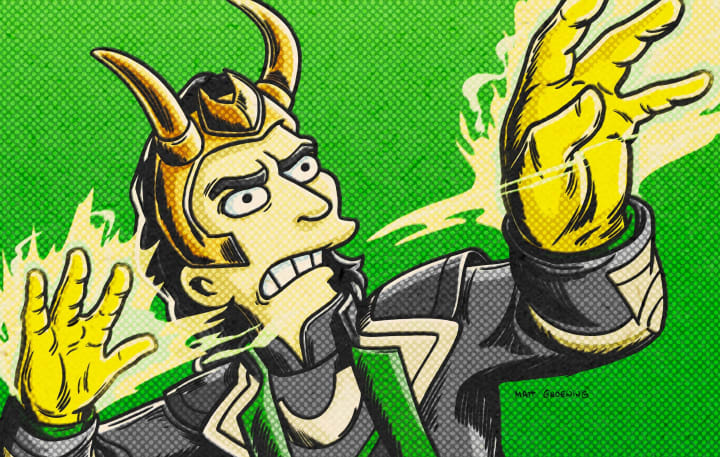
But that’s the new Marvel Way, and it is the underlying current throughout the entirety of Loki – evidenced by that sheer fact that up until episode 6 (presumedly), nothing that happens in the show really matters. It’s premise, by definition, means that the events of the narrative have no impact or even relate to the MCU as we know it. Aside from an interest in Loki the character, the only reason to watch the show is on the vague promise that it will somehow tie into Doctor Strange and the Multiverse of Madness – in a years’ time.
At least when Fox wanted to expand on Wolverine’s story, they weren’t afraid to play within their own timeline and continuity errors be damned! And, at least when Wolverine went off on his adventure, it was the same Wolverine fans had been invested in for years beforehand – they didn’t just put a slightly different outfit on Hugh Jackman and ask us to ignore everything we knew about the character up until this point as if none of it ever happened and, clearly, was ever going to happen. Which is another reason that the Loki series, and this new iteration of Loki in general, reeks of a cash-grabbing, get-richer-quick ideology from Marvel.
Loki’s story was over. He died – for real – at the hands of Thanos, after a 10-year characters arc wherein he achieved everything that he wanted. Sure, whilst he didn’t force the Earth to its knees and conquer worlds, he was King of Asgard for a while, and he did – in the end – gain the respect and love of his brother, Thor. He died in protection of something bigger than himself, and arguably in atonement for his previous involvement with Thanos – but he definitely died in a place where he felt he belonged. It was a fitting narrative and it could have enabled a new generation of magic characters to build upon his foundations. Now, it is more than likely that Loki will be a scene stealer for at least another three movies.
No, it’ll likely be more. Because if Loki the TV show has proven anything, it is that Tom Hiddleston is not the only one capable of wearing the horns. This is where Marvel has learnt from Fox’s mistakes – when Hugh Jackman aged out of the role of Wolverine (who is effectively immortal), their cow had gone dry. But, thanks to the multiverse, anyone from Richard E. Grant to a literal alligator could take the role and we’d all just go along with it. This is not too strange – since the turn of the century, comic book reboots or events are a near-yearly occurrence, because it enables a new set of fans to pick up the texts and enjoy them. Rare, if ever, does the Marvel Universe make massive, permanent, character upheavals without all just restarting the entire world around them, also.
But the MCU is a different beast, and with movies a more accessible medium than comics, perhaps this is the future of the MCU’s supporting villains. I’d be remiss if I didn’t mention Gamora is also going through a very similar storyline – though to a wildly different level of marketing and fan reaction. And that's another similarity between the roll-out of Loki and that of Wolverine – it’s coming at the expense of other characters.
When X-Men Origins: Wolverine (2009) was released, it seemed to many that this was a brand-new film series by 20th Century Fox and many were excited about where the series would go next. I was personally crossing my fingers for the Storm origin story that I knew would be epic… But it never came. Instead, we got The Wolverine (2013) and Logan (2017). And it’s looking very likely that Loki is going to equally obscure and be favourited over other characters who have had even less screen time.

But it’s not just other characters – such as Gamora, or Lady Sif, or Valkyrie – who have begun to suffer at the hands of Loki. It’s Loki himself, too. Or, rather, the dead version of Loki. Assuming, ahead of episode 6 and Doctor Strange and the Multiverse of Madness, that Loki makes his way back to Earth and the Sacred Timeline as a permanent fixture. It completely disregards and diminishes the actions of that timeline’s original Loki – imagine how Thor would feel, after he grieved so violently for his fallen brother – to find another standing in his place, but one without the heroic sacrifice or years of development? What will Hawkeye – especially now as he’s stepped into the uber-violent Ronin mantle – make of his former mental torturer be walking freely. How does Loki even actually feel about the Invasion of New York? He’s not had the years in Asgardian prison to ruminate and he’s not been personally responsible for the death of Frigga. You can’t convince me that a 20-minute “This Is Your Life” sequence at the hands of someone you’re intrinsically distrustful of will give a man the same emotional growth and development as having lived in those moments.
But what can we do about it? Ultimately – not a lot. There’s a fandom for Loki and a desire to see him on screen, as there was for Wolverine throughout the noughties, and Marvel Studios would be remiss if they didn’t follow the money and at least gives the fans some of what they want. Unlike 20th Century Fox before them, it does seem as though Marvel is not putting all of it’s chips on the familiar and fan-favourite; movies such as Shang Chi and the Legend of the Ten Rings, and bringing Kirby’s bat-shit weird Eternals into the franchise, as well as daring to tackle subjects such as race and isolationist foreign policy in The Falcon and the Winter Soldier prove that they’re not afraid to rock the boat. All we, as consumers, can do is take the shows with a pinch of salt. The MCU is now definitely a smorgasbord of genres and filming styles and no one audience must consume all of it, no matter how the internet wants to try and punish you for picking and choosing.




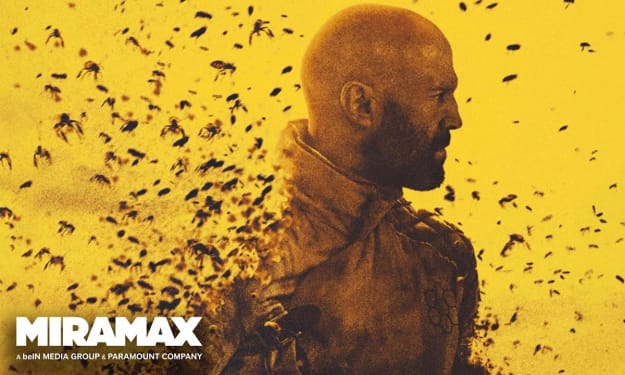

Comments
There are no comments for this story
Be the first to respond and start the conversation.